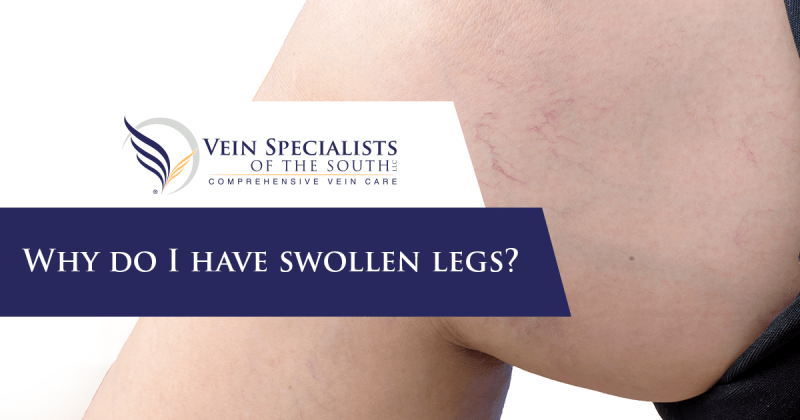What Causes Swollen Legs?
Swollen legs often get worse without treatment, affecting your quality of life. This is why it’s important to have a medical professional evaluate your condition and determine the underlying causes. Don’t ignore swollen legs, as they can be caused by serious or even urgent problems that warrant prompt medical attention, including:
- deep vein thrombosis (DVT) blood clots
- varicose veins & venous insufficiency
- lymphedema
- complications in pregnancy
- kidney disease or kidney failure
- side-effects related to prescription medications
- arthritis or other joint conditions
- physical injuries
- infections
For a better understanding, let’s dive into each of these swollen legs culprits. Note that this does not serve as a substitute for evaluation and diagnosis from your healthcare provider or a consultation with one of our vein specialists. See a medical professional if you have swollen legs, leg heaviness, or unexplained leg pain and discomfort.
Deep Vein Thrombosis (DVT) And Swollen Legs
A DVT is a blood clot that forms in the deep vein of the leg, which can sometimes cause swollen legs. In approximately 50% of all cases, there are no noticeable symptoms if a DVT is present. You may have a DVT, however, if you have any of the following symptoms:

- swollen legs
- leg pain
- skin discoloration
- skin that is warm to the touch
Seek medical care right away if you have any of the above symptoms, as a blood clot in the deep vein can loosen and travel to the lungs, causing a life-threatening condition called pulmonary embolism (PE).
What causes DVT? Most often, DVTs form when a patient has been on bed rest for an extended period of time following an injury, surgery, or during a high-risk pregnancy. Your risk is further increased if you have a genetic tendency toward the formation of blood clots. The good news is that DVT risks can be decreased by following physician instructions, wearing compression, and exercising.
Venous Insufficiency, Varicose Veins, And Swollen Legs
When your legs swell, it’s very likely caused by venous insufficiency and varicose veins. Varicose veins are very common and one of the most underdiagnosed and undertreated health conditions in the United States. Common factors associated with the development of varicose veins, including:
- a family history of venous disease
- pregnancy
- occupational risks of standing/sitting for prolonged periods
- advanced age
- extended bed rest or inactivity
- sedentary lifestyle
Varicose veins are caused by venous insufficiency; venous insufficiency occurs when the walls of the deep veins inside your legs become weak, and the valves that send blood back to your heart become damaged. This causes blood to pool in the veins, causing discomfort, swelling, and sometimes bulging veins. While these veins may have little-to-no side-effects for some patients, varicose veins have recently been linked to an increased risk of DVT. Therefore, it’s important to have your leg symptoms and any visible veins evaluated by a vein specialist.
Lymphedema, Fluid Retention, And Swollen Legs
Lymphedema is a common cause of swollen legs. The condition is caused by fluid retention due to poor lymphatic flow. The severity of swelling varies from patient to patient, but lymphedema is often uncomfortable and even painful, interfering with daily activities. Lymphedema also increases the risk of cellulitis, a serious skin infection.
What causes lymphedema? Cellulitis and lymphedema have an unfortunate cycle of cause and effect, so while lymphedema can cause cellulitis, cellulitis can also cause lymphedema. Other chronic health conditions can lead to lymphedema, including cancer. If you have cellulitis and/or swollen legs, or if you’re receiving cancer treatments, discuss these concerns with your doctor or a lymphedema specialist, such as our providers here at Vein Specialists of the South.
Pregnancy And Swollen Legs

Pregnancy is another common cause of swollen legs. Leg swelling and venous disease can begin as early as the first trimester due to hormonal changes and increased blood volume. During the second and third trimesters, pregnancy weight gain increases the odds of developing venous disease, blood clots, and swelling. Finally, as delivery nears, further changes occur in the body as it prepares to deliver; pelvic ligaments and muscles relax, affecting the venous system and overloading veins.
While most leg swelling during pregnancy is not serious and can be treated with daily leg elevation, it can be a symptom of a more serious condition such as preeclampsia (high blood pressure) or peripartum cardiomyopathy (heart failure). Speak with your OBGYN if you have swollen legs or leg cramps during pregnancy, and ask them about seeing our vein specialists.
Kidney Disease, Acute Kidney Failure, And Leg Swelling
Depending on your health and family histories, swollen legs could be linked to kidney disease and even kidney failure.
Acute kidney failure develops when your kidneys are suddenly unable to remove waste from your blood. When this happens, dangerous amounts of waste build up, causing the chemical makeup of your blood to become unbalanced. If your lymphatic system is overloaded in the face of kidney failure, you will notice swollen legs.
Kidney disease and kidney failure are serious and require immediate medical attention. If your doctor determines you are high-risk for kidney disease, you will likely have routine checks to watch the kidneys closely and treat the condition before it advances.
Prescriptions And Swollen Legs
A number of prescription medications can cause your legs to swell including calcium channel blockers, pramipexole, and corticosteroids such as methylprednisolone and prednisone. Over-the-counter medications like ibuprofen and naproxen also trigger swelling in the legs.
If you notice swollen legs after starting a new prescription, bring it up with your doctor. Before starting over-the-counter medications, talk with your doctor or pharmacist. This is especially important if you have a history of leg swelling. If you take a medication known to cause swelling, your doctor may be able to switch your prescriptions to help you find relief.
Arthritis, Joint Health, And Swelling
Arthritis and other joint health problems may be to blame for the swelling in your legs. Walking and movement of the legs through flexing and calf pumping is limited in patients who suffer from joint problems. This contributes to a strain on the venous system, which can also lead to varicose veins. Conditions associated with leg swelling include:
- rheumatoid arthritis
- gout
- knee bursitis
- osteoarthritis
If you were diagnosed with any of the above conditions and are experiencing new swelling, speak with your physician. It could be a sign that you are at risk for a DVT. Please ask your doctor to secure an Easy Access Assessment by calling in a referral to Vein Specialists of the South if you suspect a DVT.
Leg And Foot Injuries And Leg Swelling

Swelling is common when you’ve suffered a leg or foot injury. It’s important to remember that when your body experiences an injury, it goes into defense mode. This means that it sends white blood cells and fluid to the injured area. The body also releases chemicals that work to help you heal. Swelling in the legs may happen if you tear your Achilles tendon, rip a ligament or sprain something.
However, any swelling following an injury should be evaluated and treated. If ice and elevation haven’t improved swelling or you’re swelling is getting worse, schedule an appointment with your doctor. Leg swelling after an injury or surgery can be a DVT warning sign, especially if your leg is immobile in a walking boot or cast. Ask your doctor to secure an Easy Access Assessment referral by calling our office directly if you suspect a DVT.
Infections And Swollen Legs
Infections cause inflammation, tenderness, redness, and skin that is hot to the touch. If you have all of these symptoms, see your doctor, especially if you’ve had a recent leg surgery or leg injury.
Note that swollen legs on their own also increase the risk of infection. Infections can spread rapidly. Err on the side of caution and seek prompt medical attention if you suspect an infection.
Don’t Ignore Swollen Legs
Swollen legs may indicate a mild or serious condition, so if you are experiencing this uncomfortable medical symptom, be sure to speak with your doctor to determine the cause. If you suspect venous disease and/or lymphedema, our team at Vein Specialists of the South in Macon & Warner Robins, GA, can help.
Help For Leg Health Concerns In Central Georgia
If you’re suffering from swollen legs, a variety of treatment options are available through Vein Specialists of the South. We are your specialists in the diagnosis and treatment of leg swelling and venous disease From vein care, lymphatic drainage and massage to pneumatic compression devices, our specialists can recommend the best treatment for you based on your condition. Contact us today to see how we can help.













